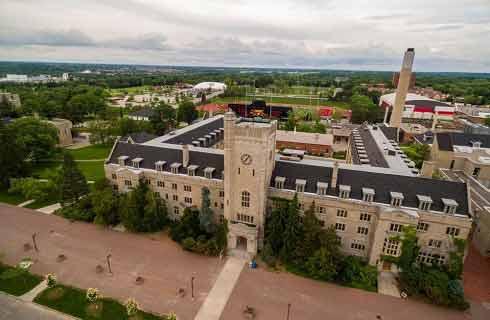Doctor of Philosophy in Counseling Psychology

学历文凭
Ph.D.

专业院系
心理咨询

开学时间

课程时长

课程学费

国际学生入学条件
Minimum Requirement for Bachelor's Level Applicants
The completion of a bachelor's degree with a major in psychology
For the 2021-2022 admissions cycle, the GRE is not required. Applicants who have taken the GRE however, are encouraged to submit their scores.
An overall undergraduate GPA of 3.00 or 3.25 for major courses or the last 60 credits of the bachelor's degree
Minimum Requirement for Master's Level Applicants
The completion of a Master's degree in counseling or a closely related area
For the 2021-2022 admissions cycle, the GRE is not required. Applicants who have taken the GRE however, are encouraged to submit their scores.
Graduate GPA of 3.50 or above
Applicants taking the IELTS are expected to demonstrate their oral English proficiency by obtaining a score of at least 7 (score range 0-9) on the speaking subsection of the IELTS and a 6.5 (score range 0-9) on the listening subsection. In addition, applicants are expected to obtain a score of 6.5 on the total IELTS before applications are reviewed by the admissions committee.
TOEFL iBT - 79
The completion of a bachelor's degree with a major in psychology
For the 2021-2022 admissions cycle, the GRE is not required. Applicants who have taken the GRE however, are encouraged to submit their scores.
An overall undergraduate GPA of 3.00 or 3.25 for major courses or the last 60 credits of the bachelor's degree
Minimum Requirement for Master's Level Applicants
The completion of a Master's degree in counseling or a closely related area
For the 2021-2022 admissions cycle, the GRE is not required. Applicants who have taken the GRE however, are encouraged to submit their scores.
Graduate GPA of 3.50 or above
Applicants taking the IELTS are expected to demonstrate their oral English proficiency by obtaining a score of at least 7 (score range 0-9) on the speaking subsection of the IELTS and a 6.5 (score range 0-9) on the listening subsection. In addition, applicants are expected to obtain a score of 6.5 on the total IELTS before applications are reviewed by the admissions committee.
TOEFL iBT - 79
IDP—雅思考试联合主办方

雅思考试总分
6.5
了解更多
- 雅思总分:6.5
- 托福网考总分:79
- 托福笔试总分:160
- 其他语言考试:Pearson Test of English (PTE) - 53<br>Duolingo English Test (DET) - 105
CRICOS代码:
申请截止日期:请 与IDP联系 以获取详细信息。
课程简介
The Counseling Psychology program at UMKC is dedicated to promoting equity, pluralism, and social justice through student training and education, research, and practice. The Counseling Psychology program at UMKC is accredited by the American Psychological Association (APA) and based upon the scientist-practitioner model of training which broadly emphasizes training in research and practice. Designed to prepare students for academic, research, and practice careers at the doctoral level, graduates of our program work in a variety of academic, teaching, and practice settings. Students are educated in the foundational aspects of professional psychology and receive specific training geared toward the principals of counseling psychology. In addition to coursework, students are expected to be actively involved in both research and counseling practice throughout their graduate training. Research training includes both preparing and completing an initial research project (which students complete by the fall of their third year) as well as a dissertation that must be successfully defended prior to graduation. In addition, students gain diverse counseling experiences at a variety of practicum training sites throughout the Kansas City area. Students have opportunities to train at our program's in-house clinic, CCAS as well as at a number of practicum sites that include (but are not limited to): university counseling centers, VA medical centers, hospitals, and community mental health centers.<br><br>Students graduating from this program will:<br><br>Graduates develop professional identities as health service counseling psychologists and are knowledgeable about the emerging roles and functions, current professional issues, and scope of research and practice in counseling psychology.<br>Graduates adhere to ethical and legal standards throughout all aspects of their professional work in psychology<br>Graduates display a level of professional integrity expected of them in their work as professional psychologists as evidenced through their interpersonal behaviors, decision-making, and ability to effectively engage in a wide variety of professional relationships<br>Graduates engage in self-reflective practices related to life-long learning as health service counseling psychologists<br>Graduates engage in culturally competent counseling and professional practice that reflects social justice values<br>Graduates demonstrate competent skills in research conceptualization, design, data analysis and interpretation, and dissemination of research findings.<br>Graduates are knowledgeable and competent in using interventions (e.g., assessment, diagnosis, treatment, supervision, consultation, outreach, etc.,) that are based in counseling theory and informed by current scientific literature in order to meet the needs of diverse clients.
相关申请

预科

奖学金

实习机会

在校学习

跨境学习

校园授课-线上开始

在线/远程学习
本校相关课程
音乐文学学士

学历文凭
Bachelor Degree
下一个开始日期
课程费用总额
生物学文学士/医学博士

学历文凭
Combined Bachelor's / Doctoral Degree
下一个开始日期
课程费用总额
城市规划与设计学士学位

学历文凭
Bachelor Degree
下一个开始日期
课程费用总额
城市研究文学学士学位

学历文凭
Bachelor Degree
下一个开始日期
课程费用总额
戏剧艺术学士学位

学历文凭
Bachelor Degree
下一个开始日期
课程费用总额
工作室艺术学士学位

学历文凭
Bachelor Degree
下一个开始日期
课程费用总额
其他相关课程
心理咨询哲学博士

麦吉尔大学继续教育学院
泰晤士高等教育世界大学排名:

学历文凭
Ph.D.
下一个开始日期
课程费用总额
咨询心理学文学硕士-项目(非论文)

麦吉尔大学继续教育学院
泰晤士高等教育世界大学排名:

学历文凭
Masters Degree
下一个开始日期
课程费用总额
心理咨询哲学博士

卡尔加里大学
泰晤士高等教育世界大学排名:

学历文凭
Ph.D.
下一个开始日期
课程费用总额
心理咨询文学硕士(项目)

维多利亚大学
泰晤士高等教育世界大学排名:

学历文凭
Masters Degree
下一个开始日期
课程费用总额
教育心理学教育硕士-咨询心理学(基于课程)

阿尔伯塔大学
泰晤士高等教育世界大学排名:119

学历文凭
Masters Degree
下一个开始日期
课程费用总额
教育心理学教育硕士-咨询心理学(基于论文)

阿尔伯塔大学
泰晤士高等教育世界大学排名:119

学历文凭
Masters Degree
下一个开始日期
课程费用总额





